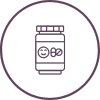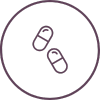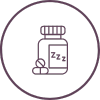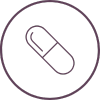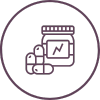
Written by:

Medically Reviewed by:
Last Updated:
January 15th, 2025
Prescription Drug Addiction Treatment | Rehab and Detox
Imagine yourself stuck in a seemingly endless loop, like a broken record, constantly repeating the same destructive patterns of self-destructive behaviour. This is exactly what prescription drug addiction can feel like and when it has you in its grips, it can be incredibly hard to escape. On the one hand, you may feel like you need the drugs for a certain medical issue and on the other, you know that they are doing you more harm than good. Recovery Lighthouse’s prescription drug rehab programmes can help you break free from this cycle, opening the door to a new life filled with opportunity, health and lasting recovery.
What is prescription drug rehab?
Prescription drug rehab is a focused treatment programme to help you overcome a physical and psychological dependence on prescription medication. The process involves a multi-faceted approach including supervised withdrawal, different types of therapy and ongoing support after you leave rehab to maintain sobriety.
Some common forms of prescription drug rehab are:
Antidepressant rehab
Learn more about the process of antidepressant addiction treatment, including antidepressant rehab and detox.
Benzodiazepine rehab
Learn more about the process of benzodiazepine addiction treatment, including benzodiazepine rehab and detox.
Sleeping pill rehab
Learn more about the process of sleeping pill addiction treatment, including sleeping pill rehab and detox.
Opioid rehab
Learn more about the process of opioid addiction treatment, including opioid rehab and detox.
Stimulant rehab
Learn more about the process of stimulant addiction treatment, including stimulant rehab and detox.
What are the goals of prescription drug addiction treatment?
The goals of prescription drug addiction treatment can be broken down into several key components:
Physical healing
The first goal of prescription drug addiction treatment is to safely withdraw all traces of the substance from your body so it can begin to heal. This process, known as prescription drug detox helps to manage and minimise withdrawal symptoms while ensuring your safety and comfort.
Psychological healing
At Recovery Lighthouse, we address the emotional and mental aspects of dependency throughout various therapeutic approaches. These therapies will help you understand the root causes of your condition, identify the triggers that cause you to take prescription drugs and develop new coping strategies for those so you no longer need drugs.
Developing healthy habits
Prescription drug rehab can help you create new, healthier habits and routines that support your recovery. At Recovery Lighthouse, this may involve learning about proper nutrition, sleep hygiene, stress management and mindfulness techniques.
Relapse prevention
Prescription drug rehab also aims to give you the tools and strategies necessary to prevent relapse. Recovery Lighthouse provides all our clients with one year’s free ongoing group therapy and other resources to help you maintain sobriety.
Reintegration
A key goal of prescription drug rehab is to help you reintegrate into society. This may involve identifying career or educational motivation, developing new hobbies and interests and fostering a sense of purpose and self-worth in the absence of prescription drugs.
By addressing these goals, prescription drug addiction treatment at a professional centre like Recovery Lighthouse can provide you with the foundations needed for successful lifelong recovery.
Building a support network
A crucial aspect of long-term recovery is having a strong support network in place to help you both during prescription drug rehab and afterwards. Our prescription drug rehab programmes incorporate group therapy, family therapy and 12-step to help you connect with others who share similar experiences and challenges.
Can prescription drug rehab help me?
The earlier you begin prescription drug rehab,the better your chances of success but many people delay getting the help they need due to feelings of shame, guilt or denial. Recognising that you need help is a crucial step in the recovery process but it is easier said than done.
To help you decide whether prescription drug rehab is right for you, here are some signs to look out for:
- Taking higher doses than prescribed or using the medication more frequently
- “Doctor shopping” to obtain multiple prescriptions
- Experiencing withdrawal symptoms when prescription drugs are not taken
- Neglecting responsibilities at work, school or home
- Experiencing financial difficulties due to purchasing prescription drugs
- Prioritising prescription drug use over relationships and other interests
- Failed attempts to quit or reduce usage
If you recognise any of these signs in yourself or a loved one, it’s time to consider prescription drug rehab and regain control over your life.
What options are there for prescription drug rehab?
There are two main options for prescription drug rehab: inpatient and outpatient treatment. Both options can be effective but they differ in terms of structure, support and intensity.
Inpatient prescription drug rehab (Recovery Lighthouse’s approach):
- Immediate admission
- Stay at the rehab centre during treatment
- 24/7 care and support
- A structured, drug-free environment with daily routines
- One-to-one therapy and group sessions
- Removal from distractions and temptations
- Typically lasts two weeks to twelve weeks
Outpatient rehab (available through the NHS)
- Limited availability
- Allows you to continue working or attending school
- Requires more self-discipline and commitment
- Offers less supervision and support
- May last several months to a year
- Only provides group therapy
While people with mild dependencies or strong support networks may be able to recover successfully with outpatient treatment, inpatient prescription drug rehab is generally agreed to be the most effective option because it gives you the time and space needed to focus on recovery.
Prescription drug rehab treatment at Recovery Lighthouse
At Recovery Lighthouse, we provide a comprehensive approach to prescription drug rehab treatment.
Our therapists utilise a variety of evidence-based therapies to address the psychological aspects of dependency and help you make meaningful changes in your life. These include:
Cognitive-behavioural therapy (CBT)
CBT is a widely used therapy that helps you identify and challenge negative thoughts, beliefs and behaviours related to your prescription drug abuse. By recognising these patterns, you can then learn to replace them with healthier and more constructive alternatives.
Dialectical behaviour therapy (DBT)
DBT is a form of cognitive-behavioural therapy that helps you learn how to manage intense emotions, cope with difficult situations and improve relationships. DBT is particularly effective if you struggle with co-occurring mental health issues alongside your prescription drug addiction.
Motivational Interviewing
Motivational interviewing helps you explore the reasons for giving up prescription drugs. Our therapists will encourage you to identify your personal reasons for seeking recovery, ultimately increasing your motivation and commitment to change. This approach empowers you to take ownership of your recovery journey and become more self-reliant which is crucial for long-term success.
Group Therapy
Group therapy is an essential component of prescription drug rehab treatment at Recovery Lighthouse. In a supportive and non-judgmental environment, you will have the opportunity to connect with others who share similar experiences and challenges related to prescription drugs.
We also provide one year’s free group therapy sessions in our aftercare programmes for all clients. These group sessions are led by our experienced therapists who facilitate open discussions, encourage the sharing of personal post-rehab stories and provide guidance and support during difficult moments. This is particularly important because making the transition from prescription drug rehab back to normal life can be very challenging.
A 101 guide to prescription drug relapse prevention
Relapse is an unfortunate reality for many individuals in recovery from prescription drugs but it doesn’t signify failure. Instead, it can be a valuable learning opportunity to refine your recovery plan and reaffirm your motivations for change. Common reasons for relapse include stress, exposure to triggers and a lack of support and once you identify why you slipped up, you can then make the necessary adjustments.
To prevent relapse in the first place, try these effective tips:
- Commit to your prescription drug aftercare programme
- Practise the healthy coping mechanisms for stress and emotional challenges that you learned in prescription drug rehab
- Build a strong support network of sober friends, family, therapists and rehab peers
- Avoid high-risk situations and triggers
- Start new hobbies to stay busy and distract yourself
- Try yoga, meditation or other relaxation techniques
- Celebrate your milestones to stay motivated and congratulate yourself on your progress
By following these tips, you will have a great chance of preventing relapse and maintaining sobriety long-term.
How to start prescription drug addiction treatment
Taking the first step towards sobriety can be challenging but the dedicated team at Recovery Lighthouse is here to help. Reach out to us today to discuss our prescription drug addiction treatment programmes and begin your journey towards a healthier, happier future. Remember, the path to recovery is a journey worth taking and we’re here to support you every step of the way.


